 Alison as a Roman (AI created) AI – artificial intelligence – seems to be with us. Will it be a horror show stripping us all of jobs, or will it be a useful tool, shortcutting a lot of donkey work and letting us get on with more important creative stuff?
Let me be clear. All my books were written by the sweat of my brow. While I used online resources for research, word checking and typo detection, all the words are mine. I also wrote the product descriptions on retailer sites such as Amazon and the back cover copy for the paperback. I created my own graphics for PR and marketing using my own photos or images I bought with a licence. Where I commissioned PR and marketing images, I paid for them. My covers have been designed by Avalon Graphics and Jessica Bell Design who are experienced book cover designers and warm and genuine people to deal with. I’ve met them both in the flesh!
Now we stand at a new frontier
We’re not quite sure of the way forward. Well, I’m not.
Were the elites and the Church worried by Gutenberg’s invention of a press that could produce multiple copies of texts relatively cheaply and quickly? Perhaps the weavers of the early 19th century who became known as Luddites were justifiably anxious about the new mechanised looms, although organised violent action by other textile workers such as stocking makers had occurred at various times since 1675.
Many wondered about Tim Berners-Lee’s invention and development of the Internet, yet we have integrated it wholeheartedly into our daily life.
But there are downsides. Unemployment, violent repression, starvation, breakdown in civil society, marauders, plunderers and scammers. The balancing cost is the price we pay for such universal progress. These days, multinational corporations want our data from our inside leg measurement and number of tooth fillings to our preferred wine and how many times we swipe our bank card across a terminal.
More than that, they want to know how and why we think and feel
Why? So they can sell our data to people who want to sell us stuff.
Now, before anybody jumps up and down screaming “Conspiracy!”, let’s think about people today. In this age of constant information, no longer solely from radio and television or even the rumour mill, but from the Internet, we have learnt to adapt.
Yes, there are innocent souls who are taken advantage of, but most of us know that not all information is as it seems. Indeed, we are more doubting about media and authority than ever before. As more and more cases of fraud and malpractice come to light, we tend to be wary of that person calling to “fix” our computer, send us a parcel we didn’t order, or claim to be our bank. This is the Stone Age brain risk aversion mechanism kicking in. It was the same instinct that made us careful of the sabre tooth tiger, the door-to-door salesman, the political canvasser or the crypto currency offers too good to be true.
One ethical question is how AI gets its data. Whether voice, images, words or music, it has to acquire knowledge and then process it. Many creative people are taken aback/shocked/angry that their work has been gobbled up by AI acquisition software without payment or recognition so that AI can use it to form answers. Is this a breach of copyright and/or downright plagiarism? Hm. Yes, I found ChatGPT regurgitated my publicly available Amazon retailer page description for one of my books when I asked it to give me an outline for a story. All I had done was input character names and a very vague idea of the story. That was weird.
In a counter argument, you could say that even when formally studying, we research the work of others, scraping their brain work and “stand on the shoulders of giants.” However, we usually credit them. Then there are others who copy essays or even plagiarise other authors to produce their own books. And this has been going on since humans learnt to write. Romans were shockingly bad in this respect as were pamphleteers in the 18th century! Nothing new under the sun, then. But legislation and regulation is on the way for the overwhelming and efficient AI, e.g. the EU agreed a landmark deal on regulation of artificial intelligence. How effective it will be is unknown, but it’s a start.
Printing, radio, telecommunications, satellite technology, the Internet and smart phones have brought us countless advantages and benefits. No more missing your friend in a crowd, no more anxious child stranded when the phone box doesn’t work, no more being unaware of a possible natural disaster affecting us. Warnings of bad weather reach us by text, we can talk in real time to families in Australia, attend events digitally, see the wonders of the rest of the world, respond quickly to events. And as for virtual archaeology and spectral examination of historical objects, thus reaching people who died hundreds, even thousands of years ago – I stare at the screens open-mouthed.
I could go on forever, but I won’t or this post will be infinite. As with past inventions, we need to tread carefully with artificial intelligence. Films such as 2001: Space Odyssey or Terminator amongst others have shown us how ‘machines’ might take over. Yes, that’s dramatic, but we should be aware that each innovation however ground-breaking comes at a cost. But beside fear and scepticism, that other essential human quality – adaptability – comes into play.
Artificial intelligence offers a great deal, most of which I’m probably not aware of, but it is up to us to master it and set the structure and rules for its use. Governments and regulatory authorities are more aware than those of previous ages. While appearing painfully slow or timid – there are elections in the offing – potential misuse and abuse are being examined and legislation introduced. Of course, we don’t know how effective regulations and laws will turn out to be, but at least it’s happening.
How do I stand as a writer/content creator?
I shall continue to write my own stories in my own words based on an outline drawn up by my own brain. Some authors may choose to use AI to generate a plot or some themes, but that’s not for me. Much as it involves ridiculous amounts of time and energy and numerous versions, I shall continue to write my own back cover and retailer page copy. What I flatteringly call my creative spark must remain at the centre of anything I write.
When it comes to PR materials, I may well dabble in the AI pond, in particular for images. So far I’ve only done it for fun as you saw in the above images. But I’ll label them as AI created.
For the future, who knows? But you can be assured that my stories will originate in my brain, human and chaotic as it is.
Alison Morton is the author of Roma Nova thrillers – INCEPTIO, CARINA (novella), PERFIDITAS, SUCCESSIO, AURELIA, NEXUS (novella), INSURRECTIO and RETALIO, and ROMA NOVA EXTRA, a collection of short stories. Audiobooks are available for four of the series. Double Identity, a contemporary conspiracy, starts a new series of thrillers. JULIA PRIMA, Roma Nova story set in the late 4th century, starts the Foundation stories. The sequel, EXSILIUM, will be out in February 2024.
Find out more about Roma Nova, its origins, stories and heroines and taste world the latest contemporary thriller Double Identity… Download ‘Welcome to Alison Morton’s Thriller Worlds’, a FREE eBook, as a thank you gift when you sign up to Alison’s monthly email update. You’ll also be among the first to know about news and book progress before everybody else, and take part in giveaways.
If you enjoyed this post, do share it with your friends!Like this:Like Loading...
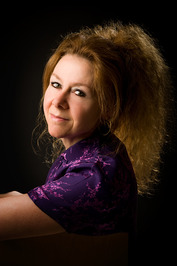
I’m delighted to welcome Christina Courtenay back to the writing blog. She writes historical romance, time slip/dual time and time travel stories, and lives in Herefordshire (near the Welsh border) in the UK. Although born in England, she has a Swedish mother and was brought up in Sweden – hence her abiding interest in the Vikings.
Christina is a Vice President and former Chair and of the UK’s Romantic Novelists’ Association and has won several awards, including the RoNA for Best Historical Romantic Novel twice with Highland Storms (2012) and The Gilded Fan (2014), and the RNA Fantasy Romantic Novel of the year 2021 with Echoes of the Runes. Shadows in the Ashes (dual time romance published by Headline Review 18th January 2024) is her latest novel. Christina is a keen amateur genealogist and loves history and archaeology (the armchair variety).
Over to Christina to tell us how she found ‘writing Roman’!
Thank you very much for having me as your guest!
I’ve been writing historical novels for some time now, and have set my stories in various different eras. Each one is like learning a new language – you have to start with the basics and build your knowledge up until you feel confident enough to create your fictional world. That takes a lot of time and effort, but at the same time it’s great fun!
My new dual time novel Shadows in the Ashes is partly set in AD 79. I’ve previously been writing mainly about the Viking period, so going another thousand years back in time was both exciting and scary for me. I’ve always love reading about the Romans, and you learn a lot from historical novels like Alison’s, absorbing information without even realising it, I think, but I still had to start from scratch when putting together my notes.
I usually create a file with headings in alphabetical order so that I can find the details whenever I need them – houses, clothes, food, laws, daily life etc. After a while, it starts to build up a picture in my mind and that’s when I’m ready to begin writing the actual story.
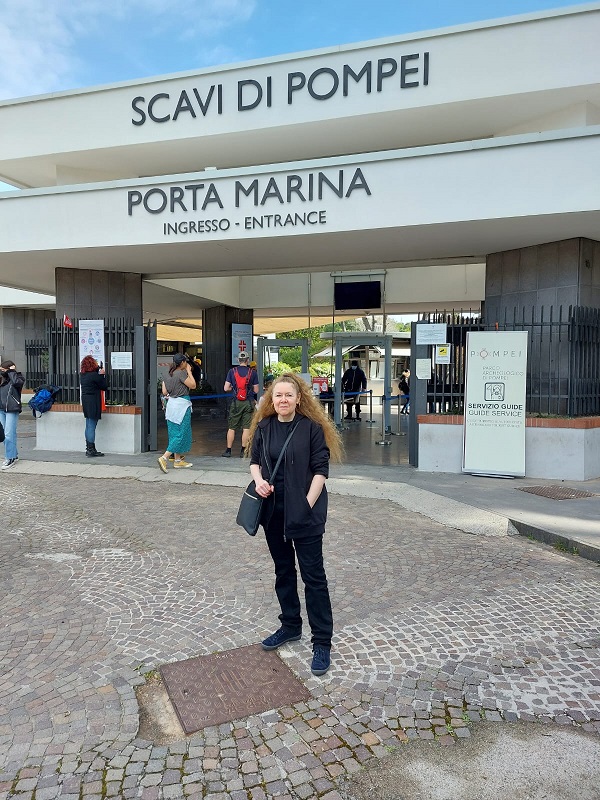 Christina at the entrance to the Pompeii site As I knew my novel would be focused on Pompeii in AD 79, I was able to narrow my research down a little, since the Roman Empire lasted a long time and not everything stayed the same. My starting point was a research trip to the site itself and the surrounding area of the Bay of Naples.
Visiting the ruins of the buried city and its neighbour Herculaneum was a wonderful experience, and vital for the invaluable details I wouldn’t have known about otherwise: how it felt to walk along the streets, what it was like to sit in a peristyle garden, how cramped the slaves’ quarters were and how dark the gladiators’ accommodation was, for example.
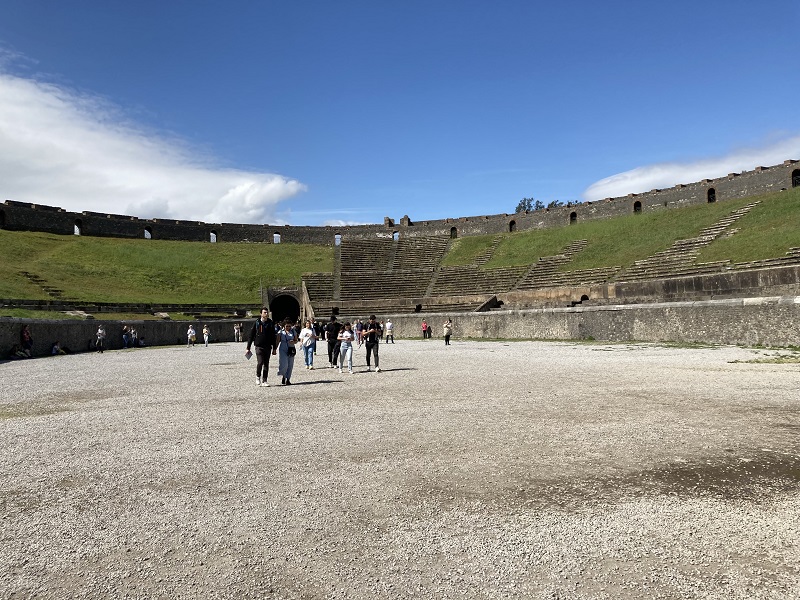
As the hero of my story is a gladiator, being able to stand in the magnificent amphitheatre was amazing. I could close my eyes and imagine the roar of the crowd, and how intimidating it must have been to walk into that arena knowing you might not leave it alive. I hope I have conveyed this accurately in Shadows in the Ashes! As historical authors, we can only use our imagination and the facts at hand and hope we get it right.
Thank you, Christina. The Bay of Naples is a fascinating place full of messages to us from the past.
———
Connect with Christina
Website: http://www.christinacourtenay.com
Facebook: https://www.facebook.com/christinacourtenayauthor?fref=ts
Twitter/X: https://twitter.com/PiaCCourtenay
Instagram: https://www.instagram.com/ChristinaCourtenayAuthor/
Bluesky: https://christinacourtenay@bsky.social
———
Discover what Shadows of the Ashes is about...
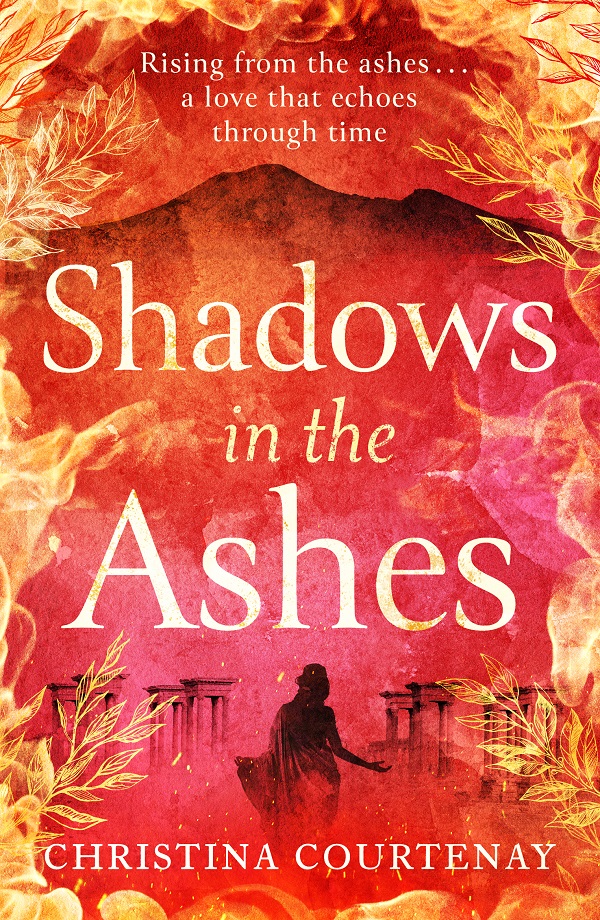 Rising from the ashes … a love that echoes through time Rising from the ashes … a love that echoes through time
Present Day – Finally escaping an abusive marriage, Caterina Rossi takes her three-year-old daughter and flees to Italy. There she’s drawn to research scientist Connor, who needs her translation help for his work on volcanology. Together they visit the ruins of Pompeii and, standing where Mount Vesuvius unleashed its fire on the city centuries before, Cat begins to see startling visions. Visions that appear to come from the antique bracelet handed down through her family’s generations…
AD 79 – Sold by his half-brother and enslaved as a gladiator in Roman Pompeii, Raedwald dreams only of surviving each fight, making the coin needed to return to his homeland and taking his revenge. That is, until he is hired to guard beautiful Aemilia. As their forbidden love grows, Raedwald’s dreams shift like the ever more violent tremors of the earth beneath his feet.
The present starts eerily to mirror the past as Cat must fight to protect her safety, and to forge a new path from the ashes of her old life…
Buy Shadows of the Ashes here: https://geni.us/STACC
Alison Morton is the author of Roma Nova thrillers – INCEPTIO, CARINA (novella), PERFIDITAS, SUCCESSIO, AURELIA, NEXUS (novella), INSURRECTIO and RETALIO, and ROMA NOVA EXTRA, a collection of short stories. Audiobooks are available for four of the series. Double Identity, a contemporary conspiracy, starts a new series of thrillers. JULIA PRIMA, Roma Nova story set in the late 4th century, starts the Foundation stories. The sequel, EXSILIUM, will be out in February 2024.
Find out more about Roma Nova, its origins, stories and heroines and taste world the latest contemporary thriller Double Identity… Download ‘Welcome to Alison Morton’s Thriller Worlds’, a FREE eBook, as a thank you gift when you sign up to Alison’s monthly email update. You’ll also be among the first to know about news and book progress before everybody else, and take part in giveaways.
If you enjoyed this post, do share it with your friends!Like this:Like Loading...
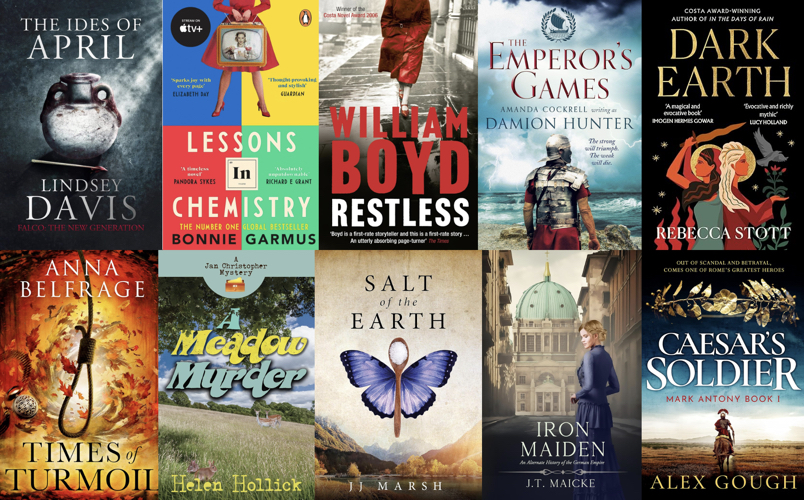
As in 2022, reading books has given me enormous pleasure. This year, I published a special 10th Anniversary hardback edition of INCEPTIO with a gorgeous case cover and dust jacket by Jessica Bell Design, plus contributed a story called ‘My Sister’ to a collection Historical Stories of Exile.
Enough of me, the writer; in this post I’m writing as a reader.
This is not a beauty contest nor a selection. I chose the books that make up the image randomly. The list below contains just books I’ve read this year and enjoyed. Some made me catch my breath, others made me weep with joy or sorrow and others appalled me. But I loved the experience of reading them all.
I’m not mentioning those I didn’t enjoy or part-read – that’s not fair to the authors concerned as I’m probably not their ideal reader.
I’m a fussy reader. I use Amazon’s ‘Send a free sample’ service mercilessly, especially if it’s an author new to me. But I have discovered some real gems that way.
Oh, and I’ve read a few non-fiction for research and ‘professional development’.
Fiction
Restless, William Boyd (re-read)
Legion XXII: The Capsarius, Simon Turney
Cloud Cuckoo Land, Anthony Doerr
The Lost Apothecary, Sarah Penner
Alternate Endings: A Short Story Anthology of Historical What Ifs, by Samantha Wilcoxson, Sharon Bennett Connolly, Michael Ross, Cathie Dunn, Karen Heenan, Salina B Baker, Virginia Crow, Elizabeth K Corbett & Stephanie Churchill
Winter Wedding at Bletchley Park, Molly Green
Mistake of Murder, Helen Hollick
Dark Earth, Rebecca Stott
The Glass Painter, Clare Flynn
The Ides of April, Lindsey Davis
City of Vengeance, D V Bishop
The Contraband Killings, Lucienne Boyce
A Tidy Ending, Joanna Cannon
The Venice Secret, Anita Chapman
Lost in Time, A G Riddle
Caesar’s Soldier, Alex Gough
The Weather Woman, Sally Gardner
The Maids of Biddenden, G D Harper
The Secrets We Keep, A J Wills
Sisters of Castle Leod, Elizabeth Hutchison Bernard
Promises of the Runes, Christina Courtenay
Siren Song, J J Marsh
Saturnalia, Lindsey Davis (re-read)
A Quiet Death in Italy, Tom Benjamin
Rocco and the Snow Angel, Adrian Magson
Death on the Marais, Adrian Magson
Murder Imperial, Paul Doherty
The Wild Poppy, Julia Bell
The Secrets of Hawthorn Place
The Wall, Douglas Jackson
Times of Turmoil, Anna Belfrage
Falling Sky, Harry Sidebottom
A Meadow Murder, Helen Hollick
Artful Antics at St Brides, Debbie Young
Signal Moon, Kate Quinn
Deadly Election, Lindsey Davis
The Garden of the Hesperides, Lindsey Davis
Rogue, Charlene Newcomb
The Husband Criteria, Catherine Kullman
The King’s Jewel, Elizabeth Chadwick
Lessons in Chemistry, Bonnie Garmus
Third Nero, Lindsey Davis (re-read)
The Beacon at Alexandria
The Maid of Linden Hall, Katie Hutton
Salt of the Earth, J J Marsh
Moonshadows, Melinda Hammond
Secret Meetings, J G Harlond
Iron Maiden, J T Maicke
The Gladiator Only dies Once, Steven Saylor (re-read)
The Secrets of Morgarten, L S Mangos
Fatal Legacy, Lindsey Davis
A Vain and Indecent Woman, Colin Falconer
The Emperor’s Games, Damion Hunter
Catalina’s Riddle, Steven Saylor
Christmas with Sophie Sayers, Debbie Young
Blackshirt Masquerade, Jason Monaghan
The Picture House Murders, Fiona Veitch Smith
Non Fiction
How To Survive in Ancient Rome, L J Trafford
Blurb Your Enthusiasm, Louise Willder
The Fall of the Roman Empire, Peter Heather
How to Best Optimize Blog Posts for SEO, Rachel Thompson
The Darkening Age: the Christian Destruction of the Classical World, Catherine Nixey
Vindobona, Michaela Kronberger
The Idea of the City in Roman Thought, Lidia Storini Mazzolani, trans. S. O’Donnell
How to Be Right, James O’Brien
On to 2024…
Alison Morton is the author of Roma Nova thrillers – INCEPTIO, CARINA (novella), PERFIDITAS, SUCCESSIO, AURELIA, NEXUS (novella), INSURRECTIO and RETALIO, and ROMA NOVA EXTRA, a collection of short stories. Audiobooks are available for four of the series. Double Identity, a contemporary conspiracy, starts a new series of thrillers. JULIA PRIMA, Roma Nova story set in the late 4th century, starts the Foundation stories. The sequel, EXSILIUM, will be out in February 2024.
Find out more about Roma Nova, its origins, stories and heroines and taste world the latest contemporary thriller Double Identity… Download ‘Welcome to Alison Morton’s Thriller Worlds’, a FREE eBook, as a thank you gift when you sign up to Alison’s monthly email update. You’ll also be among the first to know about news and book progress before everybody else, and take part in giveaways.
If you enjoyed this post, do share it with your friends!Like this:Like Loading...

Yep, it’s an old question, but a good one. Choosing and enjoying a book is very personal and each reader’s view is subjective. This is why reviews of any one book can vary so much!
I read across many genres – historical, thriller, crime, literary, romantic, sci-fi – you name it –plus all their various sub-genres.
Here’s my personal take on what makes a good read for me (YMMV).
A strong story – Well-paced, with a solid, hopefully clever plot. I need to be intrigued, entranced, captivated so I’ll read to the end. Stories should have a purpose, otherwise why tell them?
Good style – Clean and clear so that the story unfolds without me feeling puzzled. I don’t mean super-clever or self-referential or so clipped you don’t know where you are. Some stories unfold piece by piece, others go straight to the point, but all need to be well-written. Poor grammar, punctuation, sloppy construction and misuse of vocabulary jolt me as a reader out of a story. And as for those linguistic anachronisms… 🙄
A plausible world – Not necessarily real, but authentic for its supposed time and place. Whether it’s the 1980s City of London, a Mars colony or 4th century Rome, the characters should talk, work and act appropriately and not just be early 21st century people in shoulder pads, spacesuits or tunics.
However… (Makes a change from ‘but’)
Detail vs. info-dump – Enough detail to trigger my imagination, some small things to set the scene, but NOT a blow-by-blow description of every brick in every house in every town, known inelegantly as an info-dump. Details should be dripped in or woven into the book’s world so that the reader hardly notices, but accepts without question as they become immersed into that world.
Characters – Ones I can identify with, so I can find some common attitudes, experiences and feelings. They’re not me and I’m not them, but I want to connect. I’m not terrifically fond of being inside a sadistic serial killer’s head – although it could be interesting in one way – but I want to read characters who have different aspects to their personalities. A goody-two-shoes can be just as wearing as a continuously snarling villain. Will somebody please throw a bucket of water over the first and treat the second to a psychotherapy session or induce a love of kittens, I shriek! Characters should have off days, feel frustrated at traffic jams, forget a password or turn up late as well as save the world.
Dialogue – Yes, please and lots of it! Lively dialogue not only carries the story forward, it illuminates characters’ attitudes, motivations and inner conflicts. If we ‘hear’ a character ‘talking’, we feel we are in the room with them. My favourite is Elizabeth Bennet’s demolition of Darcy’s character. I find myself flinching and cheering at the same time. Jane Austen is the mistress of great dialogue.
Showing me, not telling me – This is where the story leads me and shows me what the characters do and how they react, rather than the author just telling me. Sometimes a story has to let some time go by, but clever authors will do this in one or two sentences: ‘Later that summer,’ or ‘This continued for the next few weeks.’
Change – I don’t mind whether characters are comfortable or not with their lives as long as they have made some change or developed in some way by the end of the story. Lack of knowledge or education, flaws, temper, uncertainties and vulnerabilities are all fine to start with, but please, not TSTL (Too stupid to live) or I’ll chuck the book in the bin. But most importantly, I like a character to develop from where they started in Chapter 1. They may acquire knowledge, learn to open up to others, leave one life behind, accept new realities.
Moral balance – Some characters do the right thing for the right reasons, even if it’s against ‘the rules’. But they can definitely be a bit naughty and do some morally dubious things as long as they get to the honourable goal without wrecking too much on the way. As humans, whatever is happening in the world, we like to hope a story will end in a satisfactory resolution. I haven’t used the word ‘happy’ as there is often at least a touch of sadness or loss in the course of any story.
That’s nine things. Over to you. What’s your tenth?
(Updated and republished)
Alison Morton is the author of Roma Nova thrillers – INCEPTIO, CARINA (novella), PERFIDITAS, SUCCESSIO, AURELIA, NEXUS (novella), INSURRECTIO and RETALIO, and ROMA NOVA EXTRA, a collection of short stories. Audiobooks are available for four of the series. Double Identity, a contemporary conspiracy, starts a new series of thrillers. JULIA PRIMA, Roma Nova story set in the late 4th century, starts the Foundation stories. The sequel, EXSILIUM, will be out in February 2024.
Find out more about Roma Nova, its origins, stories and heroines and taste world the latest contemporary thriller Double Identity… Download ‘Welcome to Alison Morton’s Thriller Worlds’, a FREE eBook, as a thank you gift when you sign up to Alison’s monthly email update. You’ll also be among the first to know about news and book progress before everybody else, and take part in giveaways.
If you enjoyed this post, do share it with your friends!Like this:Like Loading...
 Author photo, Château du Rivaud Sadly, there have been reports on social media and in the national press about a debut writer running a review campaign against her fellow writers. Using a number of accounts she created under different names, she’s been marking down all her perceived “competition” with 1-star negative reviews on a well known readers’ website. She also orchestrated artificial 5-star support for her own book.
This is BAD FORM. As a result, she’s lost her contract with a very prominent publishing house and gained (writing) worldwide notoriety. You have to ask where were her agent, her advisors, her friends? (Note: I understand her agent has resigned from representing her.)
No writer can succeed by themselves in the competitive environment of the book world. Perhaps that’s a surprise, but that’s how it is. And pi**ing on your fellow writers is not the way to behave.
The isolated writer?
Sitting by yourself, in a spare bedroom, study, or even at the dining room table, and tapping away on a keyboard can be a lonely business. People wonder why you don’t go outdoors on a sunny day or wander into the village for a leisurely drink at the local bar or browse around the market. But you don’t want to see, let alone talk, to other people. You are absorbed in your writing world.
Of course, you need to get the word count or the hours in on your latest work in progress – that’s understood. But why do you need to interact with other people? Ninety per cent of people probably aren’t interested in writing or in your latest work, you mutter to yourself. You’ve often watched their eyes glaze over when you reply honestly to the enquiry about how your writing is going. But ten per cent are interested and you need to find them.
Why do you need others?
- Your mental health – you’re a human being who needs contact with like-minded souls
- To learn from others’ experiences – competitions, agents, the ever-increasing number of routes to publication, especially self/indie publishing, conferences, the best courses and advisors, writing and book events
- To obtain critiques from other writers – not Auntie Maud who taught English or your mate at work who has a way with words
- To learn new writing techniques and approaches to work – not just how to sling words together, but about characterisation, the senses, novel or poetry structure, research
- To network to make those vital contacts to get your book published and to learn marketing skills from others to publicise your work yourself
- Not to bore your nearest and dearest, but to have fun with like-minded people
So where are these fellow-writers?
Starting locally, try to find a writing group. Look in the local press, the library and online. Ask anybody who has a faint connection with writing. Ask at your local book club – some of them may be writers. Have a chat to the organiser and go and try out such a group. The main requirements are a supportive open atmosphere, honesty and a lack of ego-tripping.
Next are writing associations, usually specific to a genre of writing, such as the Crime Writers’ Association, the Romantic Novelists’ Association or the Historical Novel Society. They have events, regional groups, newsletters, Facebook pages, websites, blogs – you name it! If you are thinking of self-publishing nothing beats the camaraderie of the Alliance of Independent Authors (ALLi). Even remotely, you can benefit enormously.
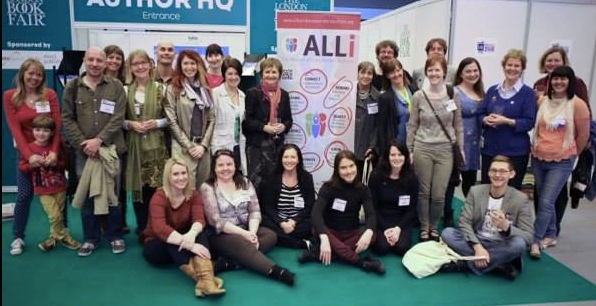 My nostalgia photo – ALLI authors meet up at the London Book Fair April 2014 Online critique groups can be a little daunting at first, but as you grow a writer’s thick skin, you’re likely to find it helpful and inspiring as well as immensely valuable. But you’ll need to plunge in!
Going to conferences can be a real boost to your writing. There are hundreds of literary festivals each year in the UK and abroad, including practical ones for writers such as the Jericho Writers events or the International Dublin Writers’ Festival where you can meet fellow writers, agents and publishers.
Moreover, you may hook up with another writer you can develop into a writing buddy, or more formally, critique partner. With Skype, Zoom and email it’s no problem to discuss and work on writing together at distance. The writing buddy must be someone you trust, so it may take a little while to get to know them. Mine has kept me sane and grounded over the years so they’re worth their weight in gold!
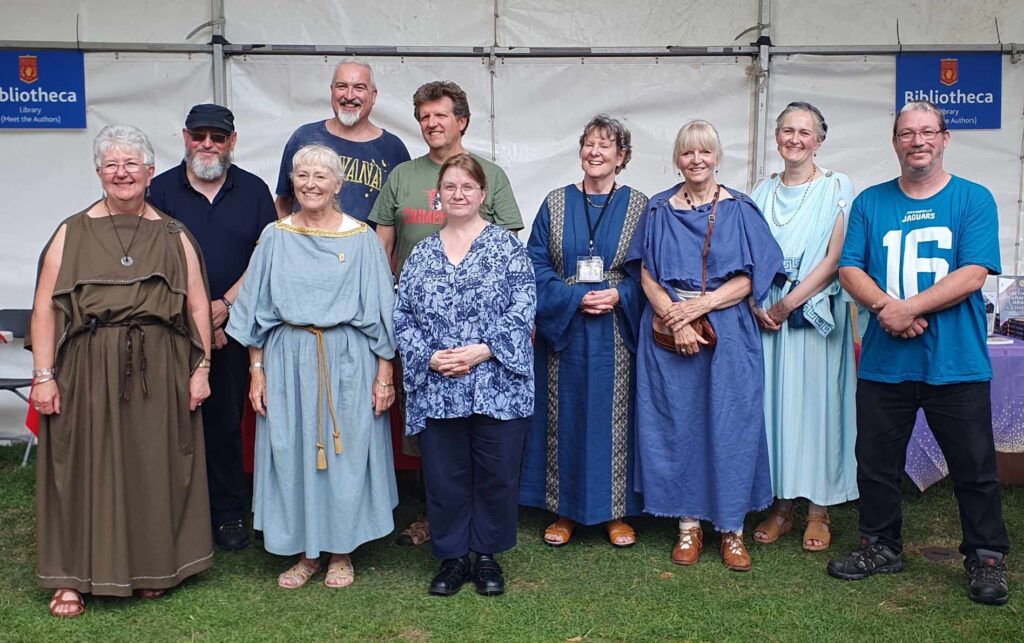 Writers at the Eboracum Roman Festival 2023 (Photo: Tracey Turney) As in life, as a writer you need other people – they are NOT your competitors.
As in life, if you behave like an arse in a community, you’ll get thrown out.
As in life, friendship and collaboration lead to a hell of a better result than floundering around alone.
Alison Morton is the author of Roma Nova thrillers – INCEPTIO, CARINA (novella), PERFIDITAS, SUCCESSIO, AURELIA, NEXUS (novella), INSURRECTIO and RETALIO, and ROMA NOVA EXTRA, a collection of short stories. Audiobooks are available for four of the series. Double Identity, a contemporary conspiracy, starts a new series of thrillers. JULIA PRIMA, Roma Nova story set in the late 4th century, starts the Foundation stories. The sequel, EXSILIUM, will be out in February 2024.
Find out more about Roma Nova, its origins, stories and heroines and taste world the latest contemporary thriller Double Identity… Download ‘Welcome to Alison Morton’s Thriller Worlds’, a FREE eBook, as a thank you gift when you sign up to Alison’s monthly email update. You’ll also be among the first to know about news and book progress before everybody else, and take part in giveaways.
If you enjoyed this post, do share it with your friends!Like this:Like Loading...
|
Subscribe to Blog via Email
Join 51 other subscribers.
Categories
Archive
|






















